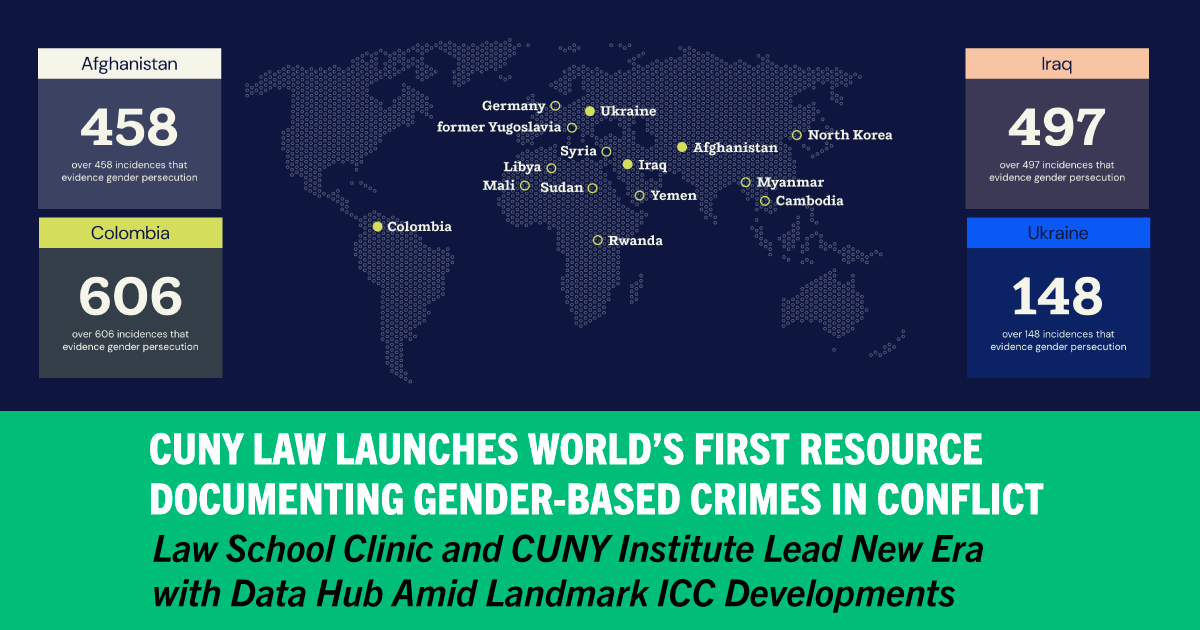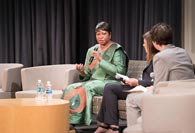Founded in 1992 by CUNY Law Professors Rhonda Copelon and Celina Romany, the Human Rights and Gender Justice (HRGJ) Clinic has been instrumental to winning recognition of gender persecution as a crime under international law. From its founding forces to today’s grassroots efforts to win accountability for gender persecution worldwide under international law and in local courts, the HRGJ Clinic is a leader on the global stage.
The Gender Persecution Observatory
In 2024, the HRGJ Clinic, along with MADRE and grassroots partners around the world, organized a series of convenings spanning five continents bringing together representatives of front-line victims’ organizations, civil society organizations, and gender justice advocates to weigh in on policy recommendations. Participants coalesced around key recommendations for the Policy on the Crime of Gender Persecution. There was also a recognition that the Principles can also be a tool towards the bigger goal of tackling the discrimination that leads to gender-based violence. This document — and the process of developing it — can help spread the term “gender persecution” beyond courtrooms and help transform society.
From its founding forces to current grassroots efforts to win accountability for gender persecution worldwide, the HRGJ Clinic continues to shape dialogue, advocacy, and policy on the global stage. As the ICC’s Office of the Prosecutor prepares to develop a set of Principles on the Crime of Gender Persecution, the Clinic’s work continues to build on research and recommendations to inform these Principles which aim to guide governments, human rights bodies, judicial actors, and humanitarian rights groups to help prevent this crime against humanity and respond appropriately when it does occur.
 The Gender Persecution Observatory Website
The Gender Persecution Observatory Website
In October 2024, HRJG launched the Gender Persecution Observatory, a groundbreaking platform that aims to increase global awareness and accountability for gender-based crimes in conflicts. An interactive hub developed in partnership with other universities and advocacy organizations, the Observatory showcases data and documentation on gender-based harms and highlights mechanisms for justice and prevention.
.
Research & Impact: Gender Persecution in Afghanistan
The Clinic and the Institute for Gender, Law, and Transformative Peace at CUNY Law is conducting groundbreaking legal analysis of systematic gender-based rights violations in Afghanistan through a series of comprehensive reports:
Gender Persecution in Afghanistan: Fundamental Rights Analysis (March 2023) This inaugural report examines how Taliban policies restricting education, assembly, and expression may constitute gender persecution under international law. Through detailed case studies and legal framework analysis, this report establishes the foundational elements of gender persecution in the Afghan context.
Gender Persecution through Employment Restrictions (January 2024)
Building on the initial findings, this report analyzes how Taliban labor restrictions and their violent enforcement mechanisms may constitute crimes against humanity. The analysis introduces an expanded framework for identifying victims of persecution, encompassing all individuals intentionally deprived of fundamental rights on a discriminatory basis.
These reports represent the first systematic legal examination of gender persecution in Afghanistan since August 2021 and provide crucial frameworks for international advocacy and accountability efforts.
Holding ISIS Accountable for Gender-Based Crimes

The Clinic hosted Chief Prosecutor of the International Criminal Court Fatou Bensouda at CUNY Law in 2018. Our Human Rights and Gender Justice Clinic presented her with a petition asking the ICC to bring charges against ISIS for persecuting people on the basis of gender.
